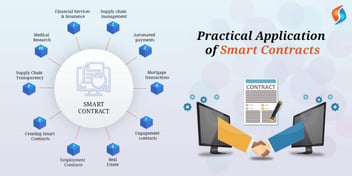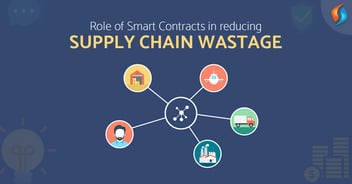Top 3 Platforms for Successful Smart Contract Development

Smart contracts are rising in popularity. They’re becoming a more efficient way to deal across geographies and are one of the more scalable applications of Blockchain technology. From real estate to banking & finance, smart contracts are becoming ubiquitous. The technology has reached a point where smart contract development is becoming accessible to small-to-midsize businesses around the world.

The growth of smart contract development demand
Research from Gartner Group predicts that 25% of global organizations will be using smart contracts by 2022. Some of the largest firms globally are working on building better smart contracts and focusing on flexibility in utilization. Companies like IBM and Intel are developing smart contract development tools to enable businesses to leverage Blockchain technology solutions fully.
This makes blockchain smart contracts development that much more viable for businesses that are in competitive industries. It provides them with an operations-based asset that is designed for scale. Using smart contracts, companies can provide operational efficiencies whose value is passing on to consumers.
As Blockchain itself becomes increasingly efficient, the cost of operating a smart contract decreases as well. This means that small businesses can actively engage with smart contract development services to enable them to use the core technology. There are a significant number of software development companies that work on smart contracts, including Signity Solutions.
Making smart contracts secure
What’s critical, is ensuring that the smart contract prepared doesn’t have security flaws. Otherwise, this could open up the contract to hackers who may steal the information present at the source. Last year the Parity bug led to $170 Million of Ether being inaccessible, because of the triggering of a flaw in the code. About $500 million has been made redundant because of similar flaws, with an increasing number of identities being leaked online.
However, researchers have also shown that many dead contracts may still be active, collecting information and leaking valuable data outside the limitations set. In the case of prodigal contracts, it is still possible for still be significant information loss because of bad code. That’s why it’s critical to ensure that the smart contract is error-free and works within the parameters in place.
Therefore, for a smart contract to be truly a utility drive, it must be deterministic, terminable and isolated. When contracts range outside of these parameters, they fall into the area of unsecured immutability. The integrity is compromised and there are grey areas in execution.
Platform 1: Linux Foundation led Hyperledger platform
Many tech companies have contributed towards the Linux foundation’s platform, and it has become a popular platform on which to build smart contracts. Companies often opt to hire blockchain developer that is adept at working on the Hyperledger platform. These developers need to understand the Go & Java programming languages.
However, the Hyperledger Fabric is one of the Hyperledger projects the Linux Foundation is hosting. It has a modular architecture that allows developers to leverage its plug & play model. It increases flexibility within the smart contract space and is used across a myriad of industries.
What are some of its advantages?
The platform is completely Open Source and free to use. This makes developing smart contracts on HL that much more accessible. Since it has permission membership, there is identity within the transaction. IBM has contributed a lot of code to the platform, making it that much easier to use.
Developers can also create contracts in several languages so that a maximum number of developers can access the platform. It also provides reliable performance and has many plug-in components. Companies can add and remove features on the go, without needing high-level coding or expensive components.
Platform 2: Developing on Ethereum
Ethereum is another popular platform used for smart contract development. The platform drives consensus through Proof of Work at the ledger level, and the sharing is among all participants. The enforcement and validation of the smart contracts happen by miner computers, and different contracts might require a different amount of gas.
However, developers use the language Solidity to create smart contracts on Ethereum. It is free to use a platform and has a massive library of documentation to adapt. The platform itself provides a significant deal of standardization across the board. This helps in developing contracts that can scale and deploy across a wide range of industries.
What are some of its advantages?
The biggest advantage of leveraging Ethereum is that it is a standard platform which is free to use. That makes the ecosystem that much stronger, and companies can review examples of similar contracts developed by other coders. Solidity, the programming language used, isn’t complex to adopt and developers can scale easily using the coding environment.
Nearly all smart contract developers have some experience using Ethereum contracts, which makes the adoption of the technology seamless. One doesn't require any special documentation to run the smart contract, making the technology viable in the long-run.
Platform 3: Stellar for Speed
Stellar is one of the top platforms if companies have the requirement for high-speed transactions using the smart contract, but they are different from Ethereum smart contracts as they are not Turing complete. The implementation is as an agreement between multiple parties. Their enforcement happens by the transaction itself. The confirmation time is a fraction of what you see in other smart contracts and the cost is much cheaper as well.
Stellar is rising in popularity and is leveraging the full potential of Blockchain to provide greater value.
What are its advantages?
Stellar’s median confirmation time is close to 5 seconds, whereas for other platforms it may range in several minutes. The cost of the contract transaction fee is negligible, and there is no gas fee for computation. Thus, for faster transactions and scaled projects, this may be the perfect option.
Developers can also choose their own validators to add security to the contract ecosystem. We can also develop smart contracts in a range of languages including JavaScript, Python, Golang, PHP, etc.
These are just three smart contract platforms, but the list is unstoppable. Want to have smart contract development for your business? Hire our outsourcing team of professionals and get started!













